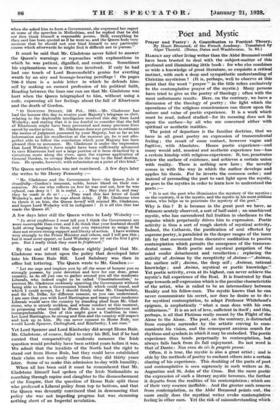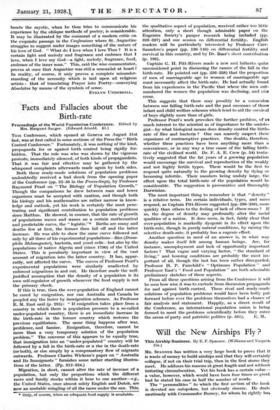Poet and Mystic
Prayer and PoetrY: A Contribution to Poetical Theory. - -By Henri Bremond, of the French Academy. Translated by-
Alger Thorold. (Bums, Oates and Washbourne. 7s. ed.)
HARDLY any other living writer than the Abbe Bremond could have been trusted to deal with the subject-matter of this profound and illuminating little book : for who else combines so wide a knowledge of great literature, so exquisite a critical instinct, with such a deep and sympathetic understanding of Christian mysticism ? (It is, perhaps, well to observe at this point that the word " prayer " in the title refers exclusively to the contemplative prayer of the mystic.) Many persons have tried to give us the poetry of theology ; often with the most unfortunate results. Here, on the contrary, we have a discussion of the theology of poetry ; the light which the operations of the religious consciousness can throw upon the nature and value of poetic experience. It is a work which must be read, indeed studied—for its meaning does not lie upon the surface--by all who are concerned either with spiritual or aesthetic realities.
The point of departure is the familiar doctrine, that we have in -all great poetry an - expression of transcendental feeling ; the result of some contact, however vague and fugitive, with Absolutes: Hence poetic experience—and many would add, musical- and aesthetic experience too—has a certain kinship with religious experience; It, too, penetrates below the surface of existence, and achieves a certain union with reality.. ..ere is nothing new here ; the novelty comes in- with the way in which the author develops and applies his thesis. For he inverts the common order ; -and instead of persuading the poet to east light upon the mystic, he goes to the mystics in order to learn how to understand the poets :— " It is not the poet who illuminates the mystery of the mystics ; on the contrary, it is the mystic, and the mystic in his most sublime states, who helps us to penetrate the ,naystery of the poet."
Why is this ? It is because in the great poet we have, as Patmore acutely observed, a sort of half-saint ; an unachieved mystic, who has surrendered full fruition in obedience to the impulse which perpetually drives him to expression. Poetic activity is thus a sort of rough sketch of mystical activity. Indeed, the Catharsis, the purification of soul effected by supreme poetry, is paralleled in the deeper ranges of the inner life by that movement from discursive meditation to passive contemplation which permits the emergence of the transcen- dental sense. Both poetic and mystical purgation of the mind confer detachment and recollection ; replacing the activity of Animus by the receptivity of Aninia--" Animus, the surface self ; Anima, the deep self;- Animus, rational knowledge ; and Anima, mystical or poetic knowledge." Yet poetic activity, even at its highest, can never achieve the mystic's full experience of the Real. It is frustrated by that urge towards self-expression which is the peculiar characteristic
of the artist, who is called to be an intermediary between Reality and his fellow-men. The mystic knows that he can never communicate his secret, nor does he desire so to do :
for mystical contemplation, to adapt Professor VVhitehead's epigram, is emphatically. "what, a man does with his own
solitariness." It is an act of love, sufficient in itself ; and this,
perhaps, is all that Plotinus really meant by the Flight of the Alone to the Alone. The poet, on the contrary, is distracted
from complete surrender by the artistic craving to com- municate his vision, and the consequent anxious search for rhythms and symbols in which it may be embodied. The poetic
experience thus tends perpetually, to contemplation, but
always falls back from its full enjoyment. Its last word is that of Dante : Non eran da cib le proprie penne. • Often, it is true, the mystic is also a great artist ; and is able by the methods of poetry to enchant others into a certain shoring of his experience. This doubling of the parts of poet and contemplative is seen supremely in such writers as St. Augustine and St. John of the Cross. But the more poetic the expression of such a literary mystic becomes, the further it departs from the realities of his contemplation ; which are of their very essence ineffable. And the greater such remove - from contemplation, as the Abbe Bremond points- out, the more easily does the mystical writer evoke contemplative feelinZ 'in other men. Yet the risk of misunderstanding which besets the mystic, when he thus tries to communicate his experience by the oblique methods of poetry; is considerable. It may be illustrated by the comment of a modern critic on the exquisite passage in the Confessions where St. Augustine struggles to suggest under images something of the nature of his love of God. " What do I love when I love Thee ? It is a certain light and melody and fragrance and embrace that I love, when I love my God—a light, melody, fragrance, food, embrace of the inner man." This, said the wise commentator, proves at once that Augustine was still a sensualist at heart! In reality, of course, it only proves a complete misunder- standing of the necessity which is laid upon all religious artists : that of translating Prayer into Poetry—conveying Absolutes by means of the symbols of sense.
EVELYN UNDERHILL.







































 Previous page
Previous page